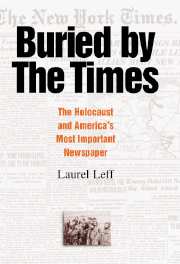Book contents
- Frontmatter
- Dedication
- Contents
- Acknowledgments
- Note Abbreviations
- Introduction: “Last Voice from the Abyss”
- PART I 1933—1941
- PART II 1942—1945
- 5 “To Awaken the Conscience of Christendom”: Pressure to Publicize the First News of the Extermination Campaign
- 6 “Amidst the Advertisements on Page 19”: Placement Decisions and the Role of the News Editors
- 7 “All Jews Are Not Brothers”: The Publisher's Fight with Zionists
- 8 “The Semitic Question Should Be Avoided”: German Atrocities and U.S. Government Propaganda
- 9 “Final Phase of Supreme Tragedy Has Begun”: The War Refugee Board and the Destruction of Hungary's Jews
- 10 “Political Prisoners, Slave Laborers, and Civilians of Many Nationalities”: The Liberation of the Concentration Camps
- 11 “Lessons from the Hitler Tragedy”: The Publisher and the Aftermath of War
- Conclusion: “The Horrible Story Was Not Told”
- Appendix A Key Individuals
- Appendix B Key Institutions
- Appendix C List of Front-Page Stories
- Notes
- Index
8 - “The Semitic Question Should Be Avoided”: German Atrocities and U.S. Government Propaganda
Published online by Cambridge University Press: 05 February 2015
- Frontmatter
- Dedication
- Contents
- Acknowledgments
- Note Abbreviations
- Introduction: “Last Voice from the Abyss”
- PART I 1933—1941
- PART II 1942—1945
- 5 “To Awaken the Conscience of Christendom”: Pressure to Publicize the First News of the Extermination Campaign
- 6 “Amidst the Advertisements on Page 19”: Placement Decisions and the Role of the News Editors
- 7 “All Jews Are Not Brothers”: The Publisher's Fight with Zionists
- 8 “The Semitic Question Should Be Avoided”: German Atrocities and U.S. Government Propaganda
- 9 “Final Phase of Supreme Tragedy Has Begun”: The War Refugee Board and the Destruction of Hungary's Jews
- 10 “Political Prisoners, Slave Laborers, and Civilians of Many Nationalities”: The Liberation of the Concentration Camps
- 11 “Lessons from the Hitler Tragedy”: The Publisher and the Aftermath of War
- Conclusion: “The Horrible Story Was Not Told”
- Appendix A Key Individuals
- Appendix B Key Institutions
- Appendix C List of Front-Page Stories
- Notes
- Index
Summary
During the decade that Henry Morgenthau, Jr., had been Secretary of the Treasury and Arthur Sulzberger had been publisher of the New York Times, they had used their friendship in their professional roles only in the rarest circumstances. For Morgenthau, January 1944 was one of those times. After intense public pressure, and sustained private lobbying from the secretary and his staff, the president on January 22 had signed an executive order creating the War Refugee Board, a government agency charged with saving as many Jews as possible during what would turn out to be the war's last year and a half. The day after, the Times ran a story about the new agency on page 11. The newspaper's ho-hum response disappointed Morgenthau, who had waged bureaucratic warfare and risked political capital to see the refugee board established. On the morning of January 29, he made one of his infrequent phone calls to the Times publisher to complain.
“Well, you carried it on – on the back page, about 18 or 20; the Tribune carried it on the front page,” Morgenthau said in a phone conversation he recorded. (The secretary was mistaken about the page.) “A number of people have commented – they said, how funny that the Tribune should carry it on the front page, and the Times somewhere in the back.”
- Type
- Chapter
- Information
- Buried by the TimesThe Holocaust and America's Most Important Newspaper, pp. 236 - 264Publisher: Cambridge University PressPrint publication year: 2005



